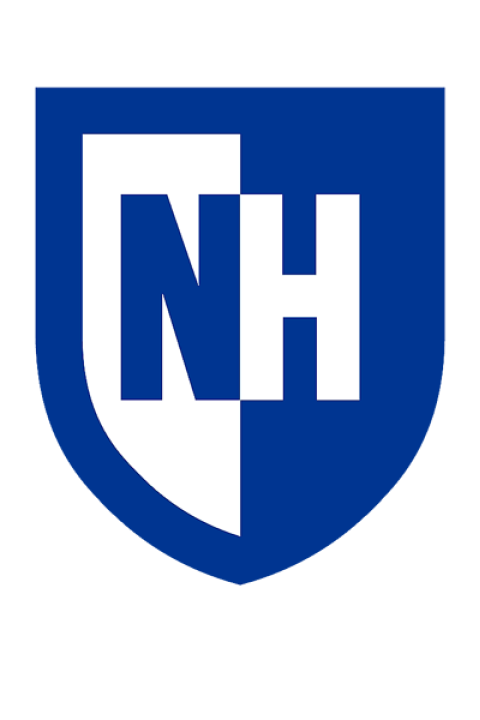Graduate with real-world skills and experience
The increased demand for accounting professionals means that students who pursue the business B.A. with an accounting option will have the opportunity to pursue an in-demand and lucrative career. Two internships provide real-world on-the-job experience.
What is the accounting option in business?
Created in response to the growing demand for accounting-trained graduates in public accounting firms and in industry, UNH Manchester's accounting option fulfills the requirements needed to sit for the Uniform Certified Public Accountant (CPA) examination. Local public accounting firms have voiced that there is increased need for accounting professionals—and that trend is also reflected nationally, with the Bureau of Labor Statistics reporting a 10% job growth rate between 2016 and 2026.
Why study accounting at UNH Manchester?
Located in the economic heart of New Hampshire, the accounting option at UNH Manchester was created so business graduates are qualified to take the CPA exam—a major step toward CPA licensure. Small class sizes offer you individualized attention from faculty, who bring years of industry experience to the classroom. In order to sit for the CPA exam in New Hampshire, you must have a bachelor's degree, 24 credits in business and 30 credits in accounting. The accounting option within the business B.A. fulfills these requirements and allows you to get real-world experience through two internships, preparing you for the opportunity to seek an in-demand and lucrative career.
Potential career areas
- Actuary
- Certified public accountant
- Commercial banker
- Credit manager
- External auditor
- FBI agent
- Internal auditor
- Loan officer administrator
- Tax accountant
- Underwriter
"The demand for CPAs and accounting professionals in New Hampshire is extremely high and growing. It is, undoubtedly, one of the most revered professions."
—Robin Abbott, CEO, New Hampshire Society of CPAs
Curriculum & Requirements
The Accounting Option is offered in response to the growing demand for accounting graduates in public accounting firms as well as in industry. Many local public accounting firms have expressed that with an expected high retirement rate among “baby boomers”, there appears to be a need for graduates with robust accounting credentials. Representatives from well-known CPA exam prep course firms expressed the opinion that accountants are in high demand and the unemployment rate in this industry is very low.
The Accounting Option offers students the necessary courses to enable them to sit for the CPA exam, which is one of the major steps in obtaining a CPA license. The requirements for sitting for the CPA exam in the State of New Hampshire are a bachelor’s degree, 24 credits in business subjects, and 30 credits in accounting subjects. The Accounting Option within the Business program provides these required credits.
This program also provides the students an opportunity to seek professional accounting positions in corporate environments. Students would be encouraged to take the CMA (Certified Management Accountant) exam, leading to this desirable certification.
For more information, contact the Manchester Office of Admissions, (603) 641-4150.
This degree plan is a sample and does not reflect the impact of transfer credit or current course offerings. UNH Manchester undergraduate students will develop individual academic plans with their professional advisor during the first year at UNH. Please note that not all accounting courses are offered every semester or even every academic year.
Sample Course Sequence
| First Year | ||
|---|---|---|
| Fall | Credits | |
| UMST 401 or UMST 402 | First Year Seminar or Transfer Seminar | 1-2 |
| ENGL 401 | First-Year Writing | 4 |
| BUS 400 | Introduction to Business | 4 |
| BUS 532 or BUS 533 | Introduction to Financial Accounting or Introduction to Managerial Accounting | 4 |
| Discovery Course | 4 | |
| Credits | 17-18 | |
| Spring | ||
| MATH 422 | Mathematics for Business Applications | 4 |
| Discovery Course | 4 | |
| BUS 532 or BUS 533 | Introduction to Financial Accounting or Introduction to Managerial Accounting | 4 |
| ECN 411 or ECN 412 | Introduction to Macroeconomic Principles or Introduction to Microeconomic Principles | 4 |
| Credits | 16 | |
| Second Year | ||
| Fall | ||
| Foreign Language | 4 | |
| ECN 411 or ECN 412 | Introduction to Macroeconomic Principles or Introduction to Microeconomic Principles | 4 |
| BUS 430 | Introduction to Business Statistics | 4 |
| BUS 603 | Intermediate Financial Accounting I | 4 |
| Credits | 16 | |
| Spring | ||
| Foreign Language | 4 | |
| BUS 615 | Intermediate Financial Accounting II | 4 |
| PTC 500 | Business Communication | 4 |
| Discovery Course | 4 | |
| Credits | 16 | |
| Third Year | ||
| Fall | ||
| COMP 405 or COMP 415 | Introduction to Web Design and Development or Mobile Computing First and For Most | 4 |
| BUS 601 | Financial Management | 4 |
| BUS 610 | Marketing Principles and Applications | 4 |
| Discovery Course | 4 | |
| Credits | 16 | |
| Spring | ||
| BUS 405 | Introduction to Business Computer Applications | 4 |
| BUS 620 | Organizational Behavior | 4 |
| BUS 690 | Business Program Internship | 4 |
| Discovery Course | 4 | |
| Credits | 16 | |
| Fourth Year | ||
| Fall | ||
| BUS 705 | Business Ethics | 4 |
| Discovery Course | 4 | |
| BUS 535 | Federal Taxation | 4 |
| Accounting Elective | 4 | |
| Credits | 16 | |
| Spring | ||
| BUS 750 | Business Capstone Senior Seminar - Internship | 4 |
| BUS 720 | Auditing | 4 |
| Discovery Course | 4 | |
| Accounting Elective | 4 | |
| Credits | 16 | |
| Total Credits | 129-130 | |
Degree Requirements
All Major, Option and Elective Requirements as indicated.
*Major GPA requirements as indicated.
Major Requirements
Students must complete 128 credits to graduate. Each required course must be completed with a minimum grade of C-. Students must attain a minimum GPA of 2.0 in major courses required for graduation. Majors cannot use BUS 430, ECN 411, or ECN 412 to satisfy both Discovery Program and major requirements. Transfer students must complete at least half of their credits in the major and the 8-credit capstone experience courses in-residence at UNH Manchester.
| Code | Title | Credits |
|---|---|---|
| Introductory Business Core Courses | ||
| BUS 400 | Introduction to Business | 4 |
| BUS 405 | Introduction to Business Computer Applications | 4 |
| BUS 430 | Introduction to Business Statistics | 4 |
| BUS 532 | Introduction to Financial Accounting | 4 |
| BUS 533 | Introduction to Managerial Accounting | 4 |
| ECN 411 | Introduction to Macroeconomic Principles | 4 |
| ECN 412 | Introduction to Microeconomic Principles | 4 |
| ENGL 401 | First-Year Writing | 4 |
| MATH 420 | Finite Mathematics | 4 |
| or MATH 422 | Mathematics for Business Applications | |
| or MATH 425 | Calculus I | |
| PTC 500 | Business Communication | 4 |
| Select one course from the following: | 4 | |
COMP 405 | Introduction to Web Design and Development | |
COMP 415 | Mobile Computing First and For Most | |
COMP 430 | Systems Fundamentals | |
| Intermediate Business Core Courses | ||
| BUS 601 | Financial Management | 4 |
| BUS 610 | Marketing Principles and Applications | 4 |
| BUS 620 | Organizational Behavior | 4 |
| BUS 690 | Business Program Internship 1 | 1-4 |
| Capstone Experience | ||
| BUS 705 | Business Ethics 2 | 4 |
| BUS 750 | Business Capstone Senior Seminar - Internship 2 | 4 |
| or BUS 760 | BUS SR SEM - Research Project | |
| Total Credits | 65-68 | |
- 1
Experiential learning is required prior to the last semester at the University. BUS 690 Business Program Internship satisfies this experiential learning requirement.
- 2
Business Capstone Experience (two courses: BUS 705 Business Ethics and one senior business seminar [BUS 750 Business Capstone Senior Seminar - Internship or BUS 760 BUS SR SEM - Research Project] fulfills the Discovery Program capstone requirement for business majors and is taken during the senior year).
Note: Because this is a bachelor of arts program, students must fulfill a language requirement. Efforts will be made to enhance fluency through subsequent courses and community experiences.
| Code | Title | Credits |
|---|---|---|
| Accounting Option | ||
| Required Courses | ||
| BUS 535 | Federal Taxation | 4 |
| BUS 603 | Intermediate Financial Accounting I | 4 |
| BUS 615 | Intermediate Financial Accounting II | 4 |
| BUS 720 | Auditing | 4 |
| Select two courses from the following: | 8 | |
BUS 712 | Accounting Information Systems | |
BUS 725 | Financial Statement Analysis | |
HLS 640 | Forensic Accounting | |
| Total Credits | 24 | |
Program Learning Outcomes
At the conclusion of the Business program, students should be able to demonstrate:
- Apply breadth and depth of knowledge about business and economic concepts, theories and methodologies, especially in the sub-field concentrations of accounting, finance, management, business ethics, leadership, organizational behavior, human resources, marketing/sales, statistics, business computer/software applications, and business data analytics, and how these varying fields are inter-related and complementary.
- Apply critical thinking skills to the qualitative and quantitative analysis of data through working knowledge of office suite products such as Microsoft Word, Excel, and PowerPoint, PowerBI or Tableau, including analysis of the data’s impact on business decision making in local, national, and global business situations.
- Information literacy, including the ability to find, retrieve, analyze, and communicate information from online or traditional venues in the fields of business, economics, accounting, finance, management, human resources, entrepreneurship, leadership, organizational behavior, marketing, and business ethics.
- Effective interpersonal writing and presentation skills in all types of business and professional communications: memoranda, case studies, analytical reports, data visualizations, slide presentations, and project reports, along with the ability to convey this information with audiences in the private and public sectors, including the ability to lead discussion groups and multi-task project teams.
- Professionalism in the workplace, including sensitivity to cultural differences and an appreciation for the diversity of human experience and perspectives, as well as an understanding of the meaning of engaged citizenship as members of an ethical business community.
Explore Program Details
-
Associate ProfessorDepartment of Business and Public AffairsEmail: Yvette.Lazdowski@unh.eduPhone: (603) 641-4374
The demand for business-savvy accounting graduates is growing, with the Bureau of Labor Statistics projecting positive growth in many related professions between 2012 and 2024. Not only are your career possibilities vast, but many also come with lucrative salaries.
Job Title |
Job Growth |
Median Salary |
| Accountant or Auditor | 11% | $67,190 |
| Budget Analyst | 3% | $71,590 |
| Compensation and Benefits Managers | 6% | $111,430 |
| Financial Analyst | 12% | $80,310 |
| Personal Financial Advisor | 30% | $89,160 |
Enhance your degree with our business minor, which gives you a foundation of desirable business skills and a valuable credential to add to your portfolio and resume.
Add to your marketability with the forensic accounting minor, which gives you the skills and techniques to examine, detect and prevent fraudulent activity in a range of business, governmental and legal venues.
Add a breadth of perspective to your degree with our political economy minor, helping you land a career in government, public service, business, communications or law.
In partnership with the New Hampshire community colleges below, we've developed a pathway to show you which courses at your community college will transfer into UNH Manchester's accounting program.








